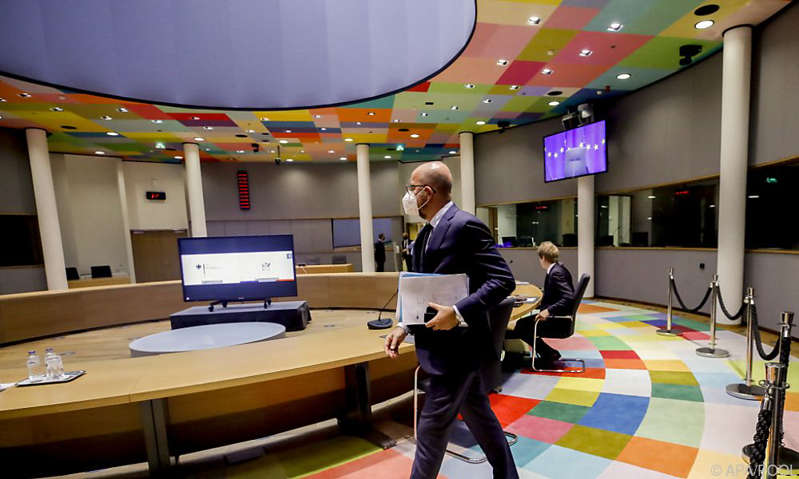Germany and France want to realign their Russia policy at the EU summit. In the evening, the 27 heads of state and government will discuss a Franco-German proposal that provides for a new sanctions regime, but also a summit with Russian President Vladimir Putin. Federal Chancellor Sebastian Kurz (ÖVP) welcomed the move for a meeting with the Kremlin chief. He also spoke out in favor of new EU refugee aid to Turkey.

Image: APA / POOL
It could not be that the dialogue with Russia and the EU “is limited to us sitting there and watching what (US President Joe) Biden and Putin discuss,” said shortly before the EU meeting. The EU “is geographically closer to Russia, many of the problems affect us more directly than the US,” said the Chancellor. Therefore, “we as well as Germany and other states will demand that there must be a direct exchange between the European Union and Russia, despite all the differences”. He supports a “dual approach”: Clear reaction to human rights violations, but still leave channels of conversation open.
German Chancellor Angela Merkel made a similar statement. “It is not enough for American President Joe Biden to talk to the Russian President,” said Merkel. “The European Union must also create discussion formats here.”
Representatives of other EU countries such as the Netherlands and Latvia expressed their skepticism. The Kremlin only understands “power politics” and does not see “any free concessions as a sign of strength,” said Latvian Prime Minister Krisjanis Karins.
Russia, meanwhile, welcomed the push to return to high-level meetings with the EU. The Ukrainian government, however, warned against resuming talks.
The EU is similarly divided on its relationship with Turkey and on migration policy. Some states want to save the 2016 refugee pact with Turkey. The government in Ankara should therefore be given the prospect of new aid to care for Syrian refugees – according to the EU Commission, that would be 3.5 billion euros by 2024.
Kurz stated: “If the European Commission takes additional money into hand here, it is appropriate and okay, but it must also be linked to preventing people from illegally moving on.” Germany also supports the proposal.
At the same time, Kurz referred to the human rights situation in the country. “There are still human rights violations taking place there, and fundamental rights and freedoms are restricted.” Kurz welcomed the EU's swift reaction to developments in Belarus, while at the same time emphasizing that he did not want to look the other way around Turkey. “As an EU, you always have credibility if you don't set double standards,” said the Chancellor.
Shortly after the summit began, the coronavirus pandemic was on the agenda. In this context, Kurz demanded that the quarantine in Europe should be completely eliminated for holders of the European Covid certificate (“Green Pass”). “It would be good if everyone were a little more generous,” but he is not sure whether this will also succeed at the EU summit.
At the start of the EU summit, the heads of state and government conferred with UN Secretary-General Antonio Guterres. He called on the EU to act together on migration issues and to show more solidarity with the countries that take in refugees.
The summit was overshadowed by a bitter dispute in the EU over a new Hungarian law on information about homosexuality. 17 states have protested and warned against discrimination against sexual minorities, Kurz also signed the letter. Hungary's Prime Minister Viktor Orban rejected the criticism and made it clear that he did not want to withdraw the law. The law will come into force in 14 days.

